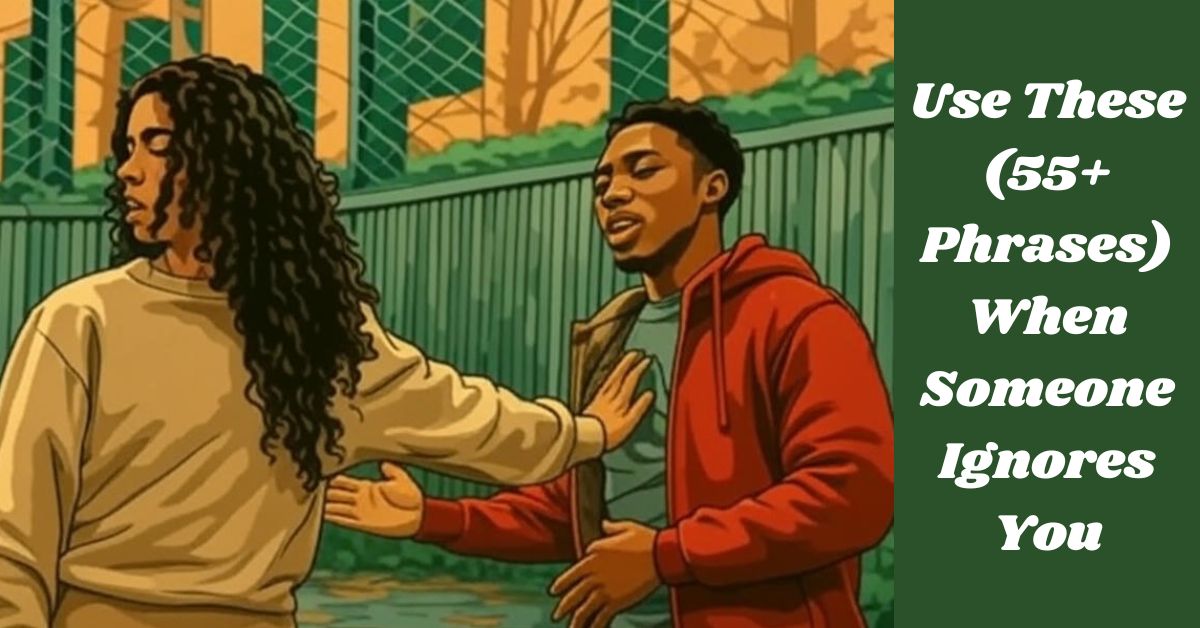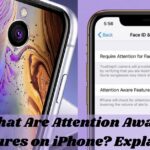Being ignored hurts deeply. The silent treatment can make you feel invisible and worthless. Everyone deserves acknowledgement and respect in their relationships. When someone deliberately ignores you, it creates a painful form of emotional neglect that can damage your mental health.
Finding the right words to respond when facing this rejection isn’t easy. You might feel helpless, confused, or even angry when dealing with communication problems caused by someone giving you the cold shoulder. The right response can help break the cycle of silence and rebuild healthy communication patterns.
This comprehensive guide offers effective phrases and strategies to address being ignored, whether it’s by a partner, friend, colleague, or family member. These responses can help you navigate the complex interpersonal dynamics of avoidance and exclusion.
Why Does Someone Ignore You?
People ignore others for countless reasons that often have nothing to do with you personally. Overwhelming emotions, conflict avoidance, or feeling hurt themselves can all trigger silent treatment. Sometimes it’s simply poor communication skills or their way of processing difficult feelings before engaging.
External factors like stress, mental health struggles, or preoccupation with personal problems can also cause someone to withdraw. Power dynamics play a role too, with some using silence as a control tactic or punishment. Understanding these motivations doesn’t excuse hurtful behavior but can help you respond appropriately.
Understanding the reasons behind someone’s silent treatment can help you respond appropriately:
- Miscommunication often leads to unintentional ignoring. Perhaps your message wasn’t received or understood correctly.
- Overwhelming emotions might cause someone to withdraw. They may need space to process their feelings before engaging.
- Conflict avoidance is common among people who struggle with direct confrontation. They might prefer ignoring issues rather than addressing them.
- Emotional distress unrelated to you could be affecting their ability to communicate. Personal problems might be consuming their attention.
- Relationship issues that haven’t been properly addressed can manifest as ignoring behaviors. Unresolved resentment often leads to withdrawal.
- Power dynamics sometimes motivate ignoring behaviors. Some use the silent treatment as a control tactic.
- Mental health challenges can impact communication abilities. Depression or anxiety might make social interaction difficult.
- Genuine busyness means they might not be deliberately ignoring you but simply overwhelmed with responsibilities.
- Indifference or fading interest might be behind their avoidance. Some people withdraw when they lose interest in a relationship.
- Self-protection drives some people to distance themselves when they feel threatened or vulnerable.
Understanding these motivations doesn’t excuse hurtful behavior but can help you respond with appropriate empathetic understanding.
55 Best Phrases When Someone Ignores You | Clever Replies

Finding the right words when faced with silence can be challenging but crucial for breaking communication barriers. These carefully crafted responses range from gentle inquiries to direct confrontations, giving you options for every relationship dynamic and situation. The key is choosing phrases that open dialogue without escalating tensions.
Whether you need professional, humorous, or more assertive approaches, having prepared responses prevents emotional reactions that might worsen the situation. These phrases acknowledge the problem while maintaining your dignity and self-respect. Remember that your goal is restoring healthy communication, not winning a power struggle.
Finding the right words when facing social rejection can be challenging. These phrases help address the silence while maintaining your dignity and opening doors for conflict resolution.
General Ways to Reply
These versatile responses work across various relationships when you’re experiencing exclusion or abandonment:
- “I’ve noticed you seem distant lately. Is everything okay between us?”
- “Your silence feels intentional. Have I done something to upset you?”
- “I value our relationship and would appreciate knowing if something’s wrong.”
- “When you ignore me, it makes me feel unimportant. Can we talk about what’s happening?”
- “I miss our normal communication. Is there something we should discuss?”
- “The silent treatment doesn’t solve problems. Can we address what’s bothering you?”
- “I respect your need for space, but could you let me know what’s going on?”
- “Your avoidance is concerning me. I’d like to understand what’s happening.”
- “If I’ve done something wrong, I’d genuinely like to know so I can address it.”
- “This silence is creating distance between us. Can we work through whatever’s wrong?”
- “I care about you and our relationship. Your silence feels like a barrier.”
- “I’m here when you’re ready to talk. This cold shoulder is hard for both of us.”
- “I understand you might need space, but complete silence leaves me confused.”
- “Our relationship matters to me. This avoidance is making me question where we stand.”
- “I’d prefer direct communication about problems rather than being ignored.”
Professional Ways to Reply
When dealing with communication problems in workplace relationships, these responses maintain professionalism while addressing the issue:
- “I notice my emails haven’t received a response. Is there a communication issue I should be aware of?”
- “I’d appreciate your input on this project when you have a moment to respond.”
- “For effective collaboration, I need your feedback. When might you be available to discuss this?”
- “I understand you’re busy, but this matter requires your attention. Could you briefly let me know your thoughts?”
- “To meet our deadline, I need your response by [specific time]. Is that possible?”
- “I believe there may be a misunderstanding between us that’s affecting our professional communication.”
- “For clarity on the project direction, I need your input. Could we schedule a brief meeting?”
- “I respect your workload, but this silence is impacting our team’s progress.”
- “Professional courtesy includes timely responses. I’d appreciate acknowledgement of my messages.”
- “If my communication approach isn’t working for you, I’m open to adjusting how we interact.”
- “Our professional relationship requires clear communication. Could we reset how we’re handling this project?”
- “I value your expertise, which is why your continued silence is particularly challenging.”
- “If there’s a reason for the delayed response, understanding it would help me adjust my expectations.”
- “For efficient workflow, we need consistent communication. How can we improve this aspect of our collaboration?”
- “I’m reaching out once more about this urgent matter requiring your attention.”
READ THIS BLOG : 50 Heartwarming Good Evening Message to My Love
Funny Ways to Reply
Using humor can defuse tension and address emotional neglect without escalating conflict:
- “Is your reply button broken, or are you just giving it a rest?
- “I’m starting to think my messages are invisible. Can you see this one?”
- “Your silence game is strong! Mind sharing your secret technique?”
- “Did you join a monastery where vows of silence are required? Just checking!”
- “I’m conducting a scientific study on how long humans can go without replying. You’re my star subject!”
- “Your message response time could qualify for the Guinness World Records!”
- “If ignoring were an Olympic sport, you’d definitely take gold!”
- “Just checking if you’ve been abducted by aliens. Send one emoji if you need rescue!”
- “My messages must be in witness protection because they’ve completely disappeared!”
- “Is this the silent movie era of our relationship? I didn’t get the memo!”
- “My phone keeps telling me I’ve sent messages to you, but I think it might be delusional!”
- “I’ve consulted with psychics about your whereabouts. They’re stumped too!”
- “Your silence is so loud, my neighbors filed a noise complaint!”
- “Warning: Prolonged ignoring may cause excessive emoji usage from me!
- “I’m starting to think you’ve hired someone to professionally ignore me. They’re doing a great job!”
Savage Ways to Reply
When hurt feelings and emotional distress build up, these direct responses clearly communicate your boundaries:
- “Your silence speaks volumes about your communication skills.”
- “I don’t chase people who can’t offer basic respect like responding.”
- “Message received. Your silence tells me everything I need to know.”
- “I deserve more than your neglect. I’ll invest my energy elsewhere.”
- “When someone shows you they don’t value communication, believe them.”
- “This silent treatment shows more about your character than anything you could say.”
- “I refuse to beg for the minimum requirement of acknowledgment.”
- “I’ve outgrown waiting for people who can’t communicate like adults.”
- “Your avoidance is actually making this decision easier for me.”
- “Thanks for showing me exactly where I stand with you.”
- “I set boundaries against the silent treatment. This behavior is unacceptable.”
- “Your silence isn’t punishing me, it’s liberating me from one sided effort.”
- “I no longer negotiate with emotional manipulators who use silence as a weapon.”
- “Consider this my final attempt at communication. The ball’s entirely in your court.”
- “I deserve someone who communicates, not someone who disappears when things get difficult.”
5 Ways To Deal With Someone Who’s Ignoring You

Handling someone’s silence requires both emotional intelligence and practical strategies to protect your wellbeing. Open communication attempts, practicing patience, and focusing on self-care form the foundation of a healthy response. Setting reasonable timeframes and boundaries helps you navigate this challenging situation without losing yourself.
Sometimes accepting your potential role in the conflict can facilitate reconciliation, while in other cases giving them space proves most effective. These approaches aren’t about manipulating the other person but about responding in ways that maintain your dignity. Remember that persistent silence might signal deeper relationship issues requiring professional help or reevaluation.
Coping mechanisms and response strategies can help you navigate the painful experience of being ignored while protecting your mental health and self worth.
Communicate Openly
Direct communication remains the most effective approach to addressing social rejection:
- Express your feelings using “I” statements to avoid sounding accusatory.
- Choose an appropriate time and private setting for this important conversation.
- Focus on specific behaviors rather than making character judgments.
- Remain calm and collected, even if you’re feeling hurt or angry inside.
- Ask open-ended questions that encourage explanation rather than yes/no answers.
- Listen actively to their perspective without interrupting or dismissing their feelings.
- Avoid making assumptions about their motivations for ignoring you.
- Be prepared to hear difficult truths about your relationship or behavior.
- Stay focused on finding solutions rather than assigning blame.
- Remember that genuine communication requires vulnerability from both parties.
Be Patient
Patience can be challenging when facing emotional neglect, but it often yields better results than pushing too hard:
- Understand that some people need processing time before they can communicate effectively.
- Respect their communication style, which might differ significantly from yours.
- Avoid bombarding them with messages, which can feel like pressure.
- Set reasonable expectations about response times based on their typical patterns.
- Use the waiting period for self reflection about the relationship dynamics.
- Practice emotional management techniques when anxiety about the silence grows.
- Recognize that healing relationship rifts takes time and cannot be rushed.
- Distinguish between someone needing space and someone using silence as manipulation.
- Remember that patience has limits; indefinite ignoring isn’t something you must tolerate.
- Balance patience with self-respect and healthy boundaries about communication.
Focus on Yourself
Self care strategies become essential when dealing with the psychological impact of being ignored:
- Redirect energy toward activities and people who make you feel valued and seen.
- Practice self-validation rather than depending on external acknowledgment.
- Engage in regular self care routines that support your emotional wellbeing.
- Reconnect with friends and family who provide healthy communication and support.
- Pursue personal goals and interests independent of the challenging relationship.
- Explore new social connections that might provide healthier relationship dynamics.
- Journal about your feelings to process them constructively rather than ruminating.
- Remind yourself that another person’s avoidance doesn’t determine your worth.
- Consider professional support from a therapist if the emotional distress becomes overwhelming.
- Use this experience as an opportunity for personal growth and boundary setting.
Give Them Time
Sometimes temporary space can facilitate better communication patterns later:
- Respect that everyone processes emotions differently and on various timelines.
- Avoid pressuring them with ultimatums or deadlines for responding.
- Use this period to evaluate the relationship’s patterns and health.
- Set a personal timeframe for how long you’re willing to wait for communication.
- Distinguish between someone needing legitimate processing time and permanent ghosting.
- Continue your life and routines rather than putting everything on hold.
- Prepare yourself for various outcomes, including the possibility of no response.
- Consider what you truly need from this relationship going forward.
- Practice emotional management techniques to handle the uncertainty.
- Remember that healthy relationships involve mutual respect for timing needs.
Accept Your Mistake
If you’ve contributed to the problem, accountability can help restore communication:
- Reflect honestly on your role in any conflict that preceded the silence.
- Acknowledge specific actions or words that might have caused hurt.
- Apologize sincerely without qualifiers or excuses for your behavior.
- Demonstrate understanding of how your actions impacted them.
- Express willingness to make amends and change problematic behaviors.
- Avoid defensive responses if they share their perspective on your actions.
- Recognize that forgiveness may take time even after acknowledgment.
- Learn from this experience to improve your communication skills.
- Accept that some damage might be irreparable despite your apology.
- Remember that accountability shows strength, not weakness.
Reverse Psychology When Someone Ignores You

Strategic shifts in your approach can sometimes break through communication barriers when direct methods fail. Maintaining genuine positivity, expressing understanding without pressure, and using light humor can create safe opportunities for the other person to re engage. These techniques work by removing perceived threats or obligations from communication.
Indirect engagement through shared interests or mutual connections offers another pathway to restored communication. These approaches should feel supportive rather than manipulative and be used thoughtfully. The goal isn’t to trick someone into responding but to create conditions where communication feels safe and natural for both parties.
These subtle behavioral response techniques can sometimes break through communication problems:
Be Positive
Maintaining positivity can shift the dynamic when facing emotional neglect:
- Approach interactions with genuine warmth despite the cold shoulder.
- Show that their avoidance isn’t destroying your happiness or stability.
- Focus conversations on positive topics rather than the fact they’ve been ignoring you.
- Express optimism about resolving whatever issues exist between you.
- Use uplifting language that makes interaction with you pleasant rather than tense.
- Share positive news or developments in your life without resentment.
- Demonstrate emotional resilience rather than fragility when they do engage.
- Project confidence rather than desperation in your communication attempts.
- Practice authentic positivity rather than forced cheerfulness, which can seem manipulative.
- Remember that your positive attitude primarily benefits your wellbeing, regardless of their response.
Express Understanding
Empathetic understanding can create a safe space for resuming communication:
- Acknowledge that they might have legitimate reasons for needing space.
- Validate their right to process emotions in their own way and time.
- Express concern for their well being rather than focusing on your hurt feelings.
- Avoid pressuring them with guilt about how their silence affects you.
- Demonstrate willingness to listen without judgment when they’re ready to talk.
- Create a blame free zone for honest communication about difficult feelings.
- Show genuine interest in their perspective on what caused the avoidance.
- Practice active listening when they do share, focusing fully on understanding.
- Respect their boundaries while still maintaining your own standards for healthy communication.
- Remember that understanding doesn’t mean accepting mistreatment or manipulation.
Playfully Call Out The Silence
Gentle humor can sometimes break tension without escalating conflict:
- Use lighthearted observations about the silence rather than accusatory statements.
- Frame the situation with gentle teasing that acknowledges the elephant in the room.
- Choose playful language that offers them an easy way to re engage without shame.
- Keep your tone genuinely light rather than passive aggressive or sarcastic.
- Use shared memories or inside jokes to reestablish connection.
- Offer a face saving way for them to resume normal communication.
- Avoid humor that might feel like mockery or dismissal of serious issues.
- Test the waters with mild playfulness before attempting more direct humor.
- Be prepared to shift approaches if playfulness doesn’t receive a positive response.
- Remember that playfulness works best in relationships with established trust.
Engage Indirectly
Sometimes interpersonal dynamics improve through side-door approaches:
- Share information or content related to their interests without demanding response.
- Invite them to group activities where one on one interaction isn’t required.
- Ask simple, practical questions that are easy to answer without emotional weight.
- Connect through mutual friends in natural, non pressuring ways.
- Reference shared experiences or inside jokes that might reawaken connection.
- Utilize social media for light, non threatening interaction.
- Create opportunities for casual encounters that don’t feel forced.
- Participate in activities you know they enjoy where conversation can happen naturally.
- Share resources, articles, or information they might find valuable.
- Remember that indirect engagement should feel supportive, not manipulative.
READ THIS BLOG : 35+ Hilarious Text Pranks to Try on Your Friends
Frequently Asked Question
Is ignoring someone a form of emotional abuse?
When used as a control tactic, the silent treatment can be considered emotional abuse. Occasional need for space differs from systematic ignoring used to manipulate or punish.
How long should I wait before giving up on someone who’s ignoring me?
Consider the relationship context and your boundaries. A few days might be reasonable processing time, while weeks of silence without explanation indicates deeper issues.
Should I ignore someone back when they ignore me?
“Tit for tat” avoidance rarely solves communication problems. Direct communication or setting boundaries is more effective than responding to silence with silence.
What’s the difference between someone needing space and someone ignoring me?
Someone needing space typically communicates this need clearly with a timeframe. True ignoring involves unexplained avoidance and often serves as punishment or control.
How can I protect my mental health when someone repeatedly ignores me?
Prioritize self care, limit investment in the one-sided relationship, build a support network, practice self validation, set firm boundaries, and consider professional support if needed.
Why do people use the silent treatment?
People may use silence as a coping mechanism, power play, conflict avoidance strategy, or because they lack communication skills to express their feelings directly.
Does being ignored affect mental health?
Yes, being ignored can trigger feelings of rejection, lower self esteem, cause anxiety, and even lead to depression when experienced chronically.
How do I know if I’m being ignored intentionally?
Look for patterns of selective responsiveness, checking if they respond to others but not you, and consider if there’s been recent conflict that might explain the behavior.
Can a relationship recover after someone has been ignored?
Recovery depends on both parties’ willingness to address the root issues, improve communication patterns, and rebuild trust through consistent behavior change.
When should I stop trying to communicate with someone who ignores me?
Consider stepping back when your attempts consistently go unanswered, the pattern has repeated multiple times, or when the situation is negatively impacting your wellbeing.
Conclusion
The experience of being ignored challenges your self-worth and tests your communication skills. While these phrases and strategies can help address the silence, remember that your value doesn’t depend on someone else’s acknowledgment.
Healthy relationships require mutual respect and communication. One-sided effort rarely creates lasting solutions to relationship issues. Sometimes the best response to persistent emotional neglect is focusing on relationships where you receive the respect you deserve.
Set clear interpersonal boundaries about acceptable communication patterns. The silent treatment is widely recognized by psychologists as a form of emotional manipulation and abuse when used regularly.Your mental health matters more than maintaining relationships with people who use avoidance as a control tactic. While temporary silence during conflict might be understandable, persistent ignoring indicates deeper relationship issues that may require professional support or reevaluation of the relationship’s viability.

Jerry is a seasoned SEO expert with a passion for content writing, keyword research, and web development. He combines technical expertise with creative strategies to deliver exceptional digital solutions.










